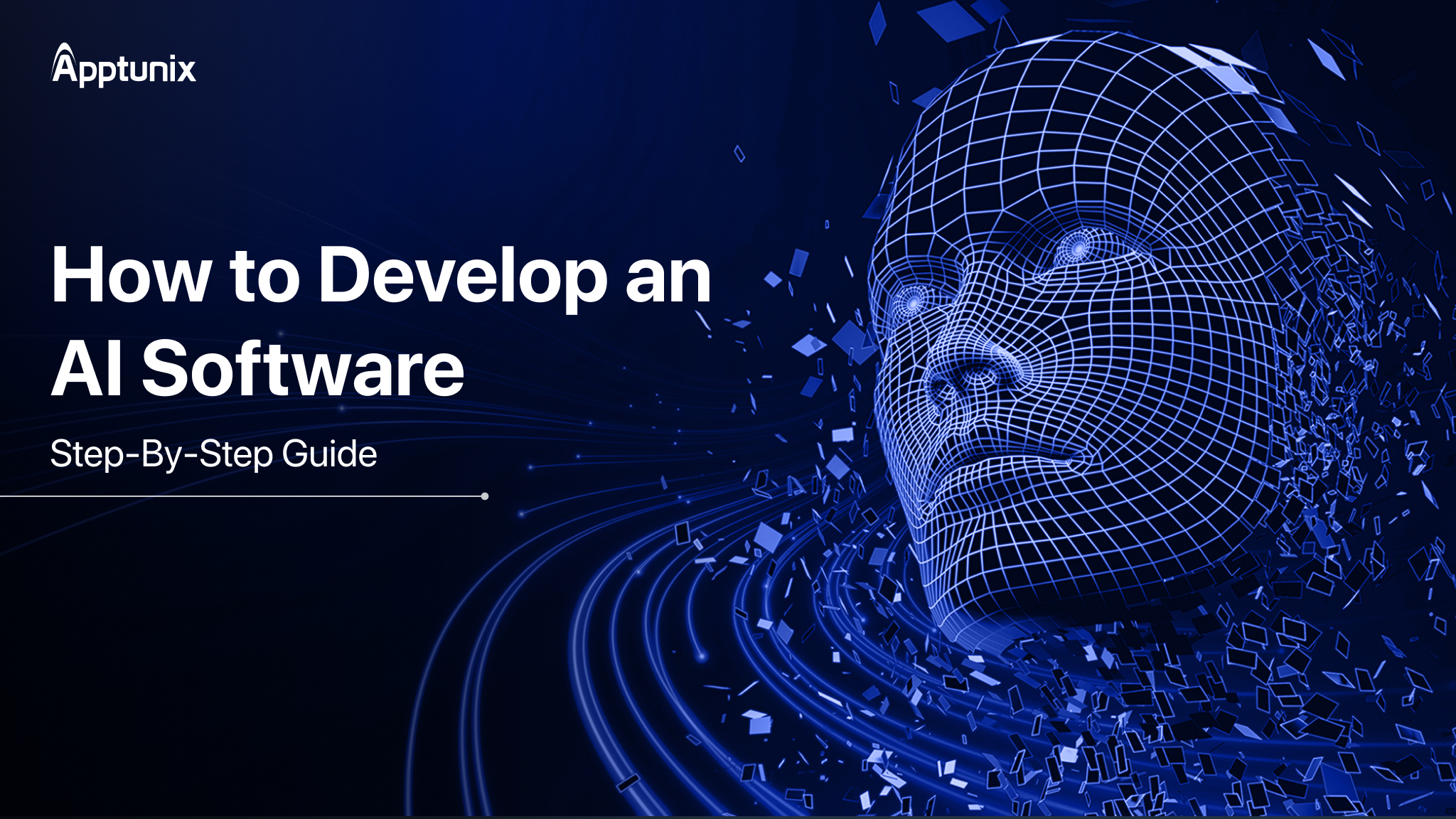
How to Develop an AI Software: A Step-By-Step Guide
1070 Views 13 min October 14, 2025

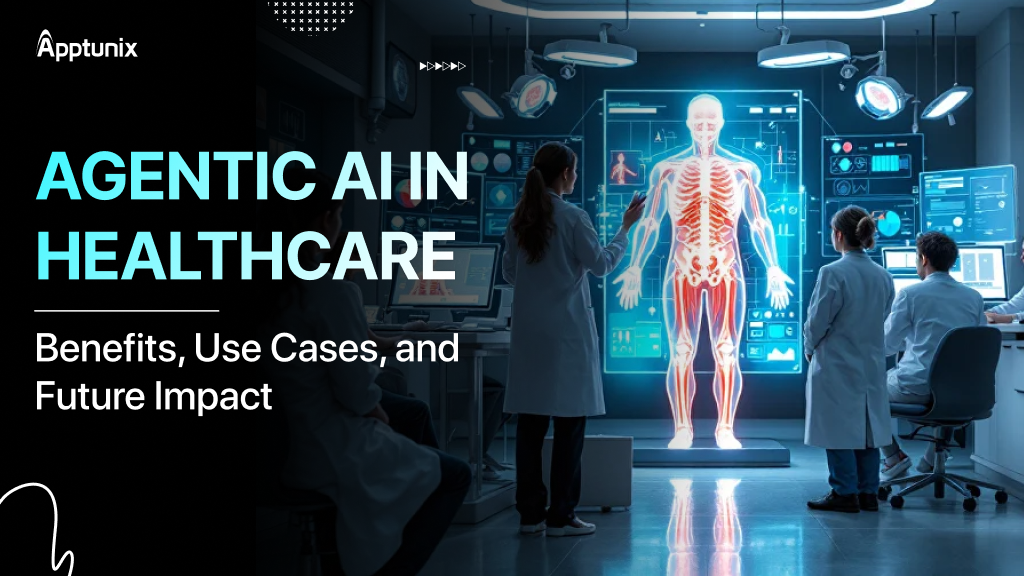
As a healthcare professional and organization, what will be your reaction when you get to know that AI-powered agents can monitor patients in real time and predict complications before they occur? Sounds interesting & convenient, doesn’t it?
This is not a scene from the future; it’s actually happening today with agentic AI in healthcare. The technology is enabling doctors to make faster and data-driven decisions.
The leading nations, such as the United States and China, are investing heavily in agentic AI healthcare development, enabling hospitals and physicians to become highly advanced. Cities such as Boston, Beijing, Singapore, Dubai, and Hyderabad are becoming the leaders in agentic AI.
According to Grand View Research, the agentic AI healthcare market size was valued at $538.51 million in 2024 and is projected to reach $4.96 billion by 2030. The market is expected to grow with a CAGR of 45.56% during the forecast period.
Agentic artificial intelligence differs from traditional AI in that it can think, reason, and act autonomously to achieve medical goals. It is transforming patient care by enabling clinical decision support, medical imaging, remote work, and more.
Indeed, the global healthcare industry moves toward a new era of precision, personalization, and efficiency as hospitals adopt these intelligent systems.
Discover more about agentic AI and its application in the healthcare sector. Furthermore, learn about its benefits, use cases, future impact, and more.
Agentic AI is an artificial intelligence system capable of autonomous decision-making, reasoning, and goal-directed actions without constant human supervision.
This AI system differs from traditional AI models, which rely solely on predefined instructions. It can actually analyze data, adapt to new information, and take steps to achieve the desired results.
Agentic artificial intelligence for hospitals, which not only processes patient data but also provides several other benefits. Agentic AI in healthcare helps monitor patient progress, suggest treatment plans, and respond intelligently to changing medical conditions.
This technology marks a crucial leap toward truly intelligent and self-directed healthcare solutions. All thanks to its ability to combine autonomy, learning, and contextual understanding.
Agentic AI is transforming the healthcare industry worldwide, with North America leading the market, holding the largest share. Examine the agentic AI healthcare market size:
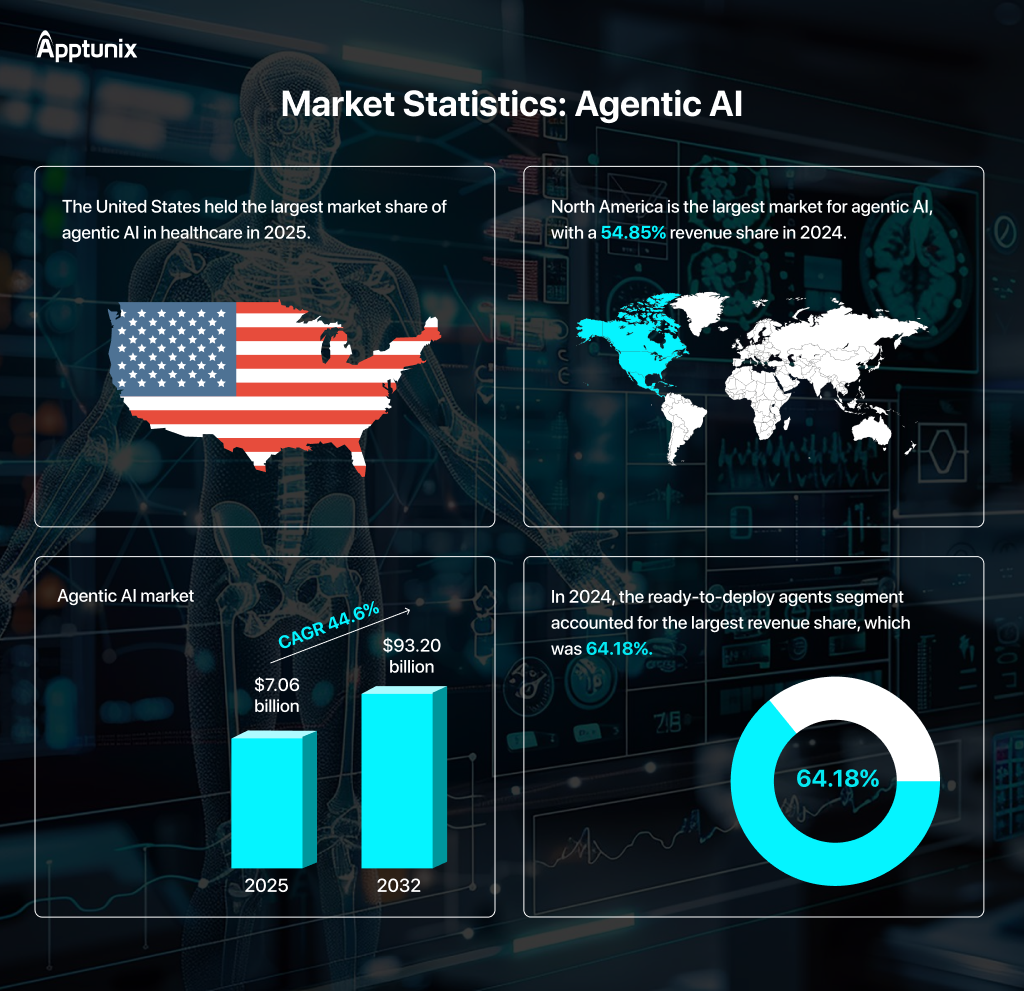
The agentic AI market stands at $7.06 billion in 2025 and is projected to reach $93.20 billion by 2032. It is expected to grow with an annual growth rate of 44.6% during the forecast.
Now explore the reasons why the healthcare industry requires the implementation of agentic AI for patient care, automation, and other factors.
Agentic AI doesn’t just analyze information, but it acts on it. In healthcare, agentic AI combines autonomy, intelligence, and real-time data processing to improve medical outcomes. Agentic AI in healthcare understands context, makes decisions, and collaborates with humans and systems to deliver proactive and personalized care.
The technology manages hospital workflows and diagnoses diseases. It basically helps in optimizing patient and operational efficiency. Examine the image to understand the working procedure of Agentic AI in healthcare:
Data Sources —> AI processing Hub —> Decision Layer —> Action Layer —> Continuous Learning —> Doctor Reviewing AI Insights
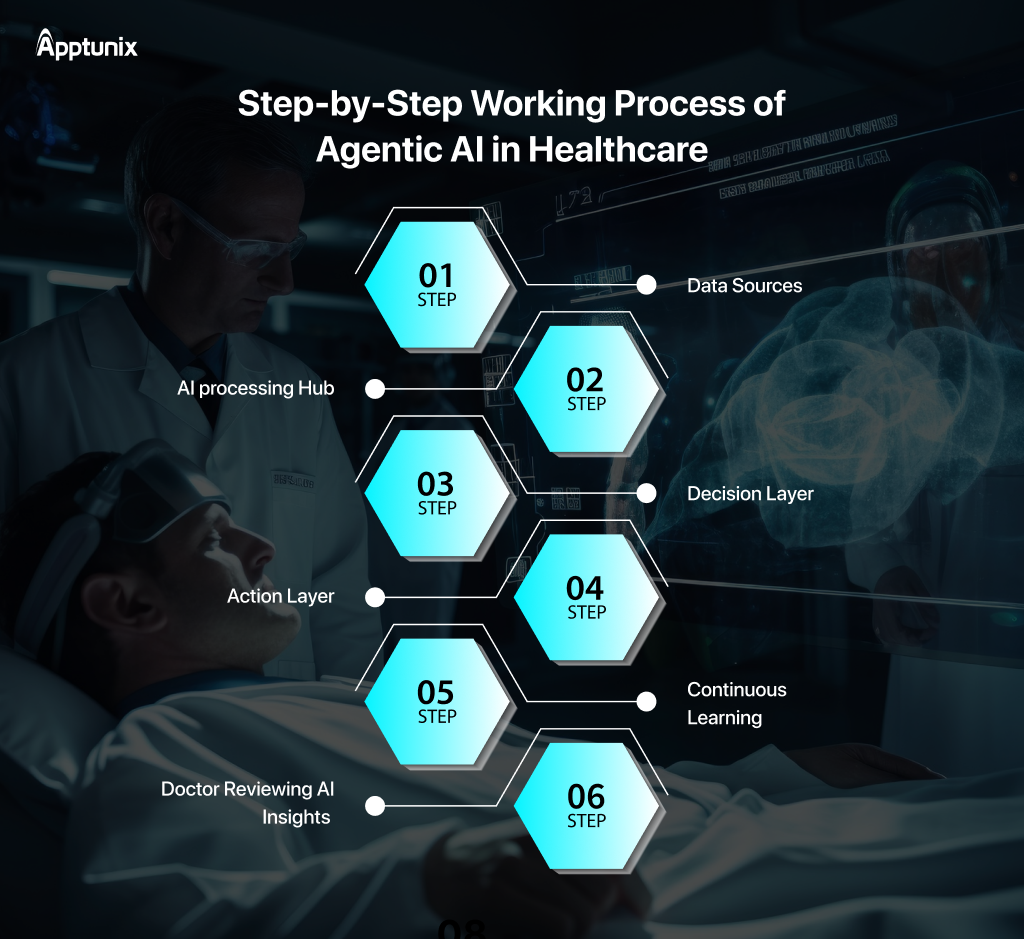
1:Data Collection and IntegrationAgentic artificial intelligence for hospitals gathers data from diverse sources, which include
This creates a unified, real-time health profile and gives doctors and AI systems instant access to accurate, up-to-date patient information. Eventually, health professionals make faster and more reliable clinical decisions.
2:Contextual UnderstandingAgentic AI uses large language models (LLMs) and machine learning (ML) to interpret patient symptoms, medical history, and clinical notes. This helps in understanding the context and intent behind the data. Allows the artificial intelligence to –
3:Decision Making and ReasoningAutonomous AI agents in healthcare use reinforcement learning and multi-agent collaboration to:
Agentic artificial intelligence continuously refines its reasoning according to patient feedback and medical data. This enables more accurate and personalized treatment recommendations over time.
4:Autonomous Action ExecutionAgentic AI in healthcare allows hospitals and health professionals to schedule tests, alert doctors, adjust medication doses, or trigger emergency responses based on insights. This reduces human workload and the risk of errors.
This advanced AI technology also enables real-time, data-driven interventions, enhancing patient safety and improving overall hospital efficiency.
5:Continuous Learning and AdaptationMulti-agent systems healthcare AI continuously learns from outcomes and feedback and offers several benefits, like;
The ongoing learning process enables the agentic AI to evolve over time and with each interaction. This ensures smarter, data-backed insights over time for hospitals and clinicians.
6:Collaboration with Healthcare ProfessionalsThe best thing about agentic AI is that it doesn’t replace healthcare professionals, but it assists them. Agentic AI in healthcare provides real-time recommendations, insights, and patient monitoring to healthcare professionals. This leads to faster and safer clinical decisions.
Essentially, agentic AI enables a human-AI partnership in which technology enhances medical expertise. It improves both quality and operational efficiency.
Agentic AI in healthcare applications is transforming the healthcare landscape through smarter operations, faster decisions, and more personalized care. This autonomous system also helps hospitals boost efficiency and deliver better patient outcomes. Examine the agentic AI healthcare benefits now:
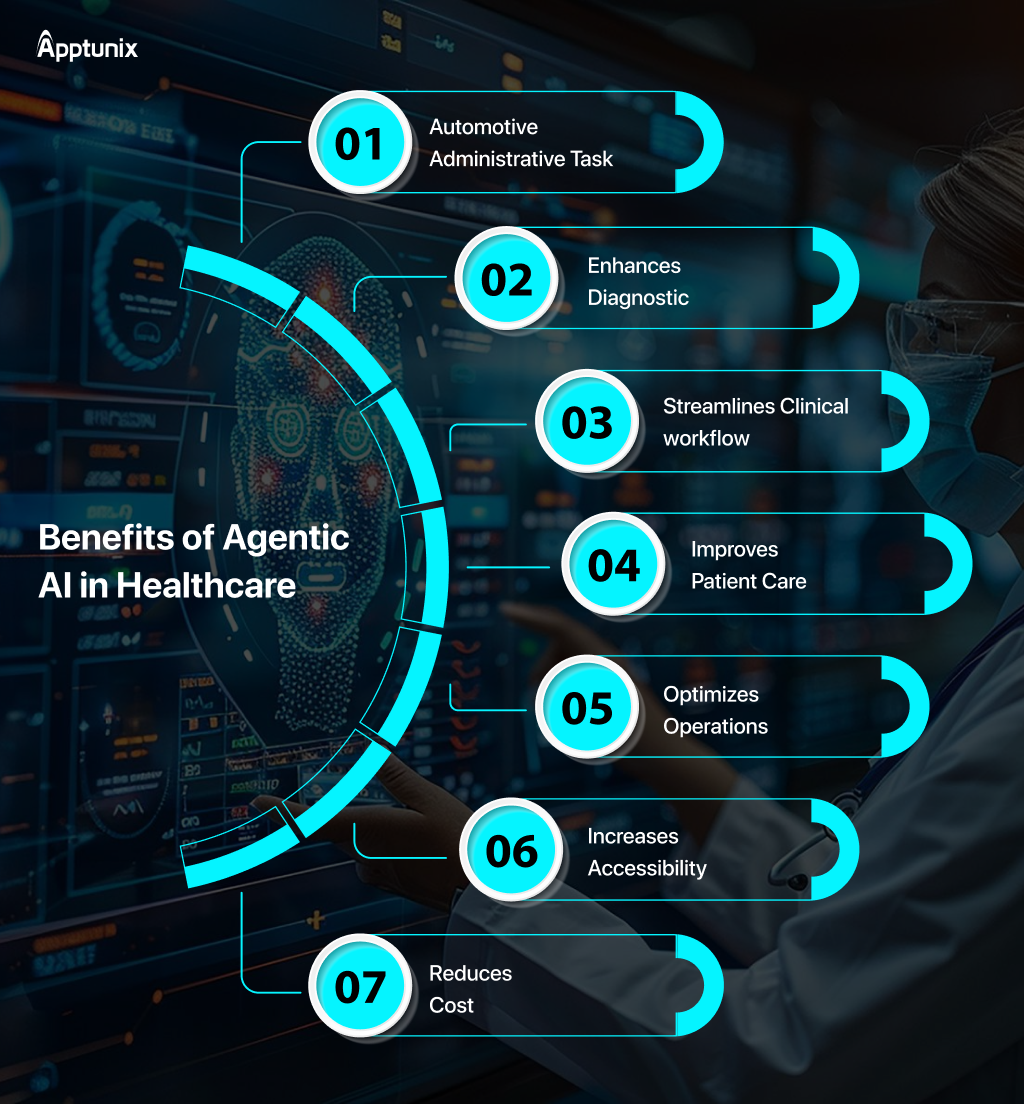
1:Automotive Administrative TaskAgentic AI in hospitals streamlines repetitive administrative tasks like
The technology enables healthcare professionals to focus on patient care by automating these time-consuming processes. Agentic AI minimizes human errors and enhances hospital productivity and operational efficiency.
2:Enhances DiagnosticAgentic AI helps healthcare professionals detect diseases early through advanced reasoning and real-time data analytics. The technology analyzes imaging, lab results, and patient histories to generate accurate diagnostic insights.
Integrating agentic AI into healthcare improves diagnostic speed and precision, leading to timely treatments and better patient outcomes.
3:Streamlines Clinical WorkflowAutonomous AI agents in healthcare optimize workflow by integrating data from various hospital departments. Basically, it coordinates.
This reduces delays, eliminates redundancies, and ensures that every patient’s care steps are efficient and well coordinated.
4:Improves Patient CareAgentic AI development in healthcare helps healthcare businesses and professionals predict complications before they occur. This is done by the tech team through continuous monitoring of patients using IoMT devices and data-driven insights.
It supports personalized care plans based on each patient’s unique health data. Agentic AI’s approach enhances recovery rates and overall patient satisfaction.
5:Optimizes OperationsAgentic AI in healthcare applications helps hospitals and healthcare institutions allocate resources like staff management and equipment usage effectively. This highly advanced AI analyzes hospital performance metrics to detect inefficiencies and suggest improvements.
Agentic artificial intelligence in healthcare helps hospitals to maintain higher productivity and lower operational costs without compromising on care quality.
6:Increases AccessibilityIntegrating AI-powered virtual agents and telehealth increases access to healthcare in remote and underserved areas. Agentic AI in healthcare enables
It eventually bridges the healthcare gaps and provides timely medical assistance beyond hospital walls.
7:Reduces CostAgentic AI healthcare development significantly cuts healthcare costs by automating operations, optimizing workflows, and preventing medical errors. This AI technology minimizes unnecessary tests, reduces hospital readmissions, and streamlines resource use.
Over time, these savings enable hospitals to deliver affordable, high-quality care on a larger scale.
It not only helps doctors and hospitals save money but also benefits every individual and organization in the healthcare industry. Agentic AI healthcare benefits pharmaceutical and life sciences companies, health technology companies, public healthcare agencies, researchers, and data scientists, enabling them to save money.
Let’s examine the use cases and real-life examples of agentic AI in the healthcare industry.
With intelligent automation, predictive analytics, and autonomous decision-making, agentic AI is transforming the healthcare industry. Unlike traditional AI, agentic AI learns, reasons, and acts independently. The technology drives efficiency, accuracy, and innovation across the global healthcare ecosystem. Let’s find out the top use cases and real-world examples of agentic AI:
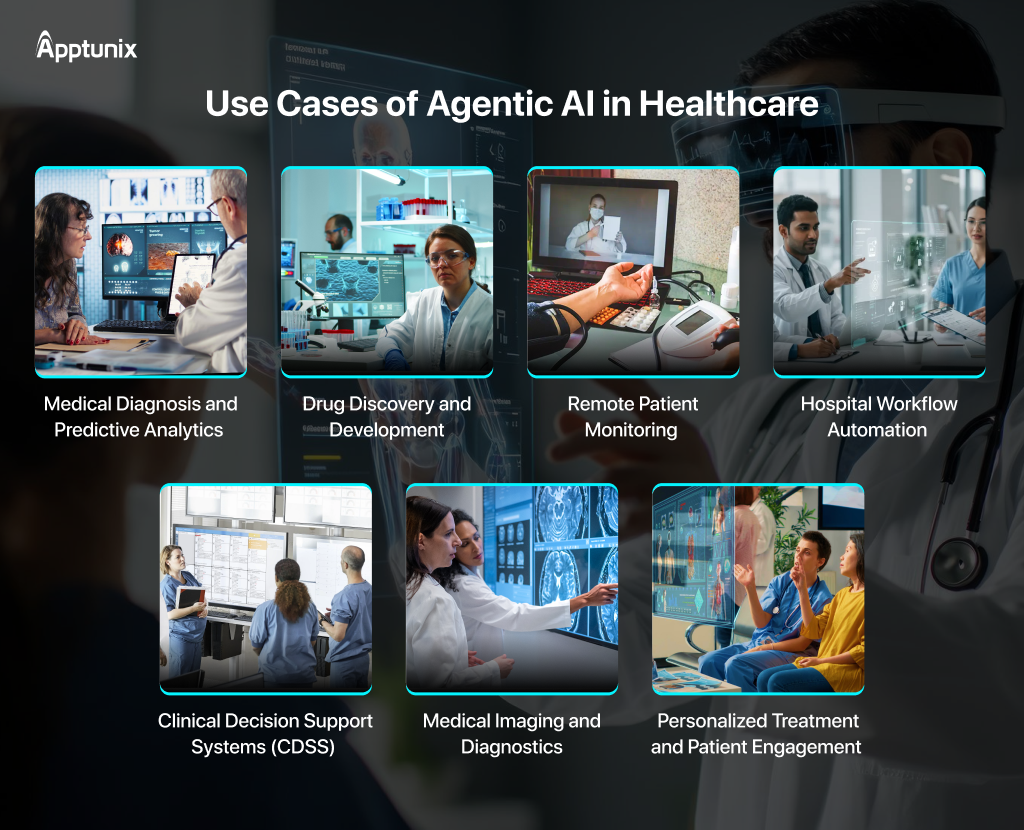
The best use case for agentic AI is its ability to analyze complex patient data, predict diseases, and suggest early interventions. This AI processes lab results, imaging, and genetic data to identify patients at high risk.
Example: IBM Watson Health uses agentic AI algorithms to predict cancer risks and enables early detection. It also improves survival rates and treatment recommendations.
Agentic AI drug discovery in healthcare accelerates drug research by simulating molecular reactions and identifying potential compounds. This happens faster than traditional AI methods. Pharmaceutical companies use agentic AI to reduce the time and cost of developing new drugs.
Example: DeepMind’s AlphaFold helped researchers map protein structures to discover treatments for diseases like Alzheimer’s and Parkinson’s.
Agentic AI in healthcare applications monitors patients’ vital signs in real time through IoMT devices and wearables. This helps healthcare professionals to predict emergencies before they happen. It helps health professionals take proactive action even from AFAR, a nonprofit organization that supports biomedical research.
Example: Philips HealthSuite uses AI-driven monitoring to alert clinicians of abnormal heart or oxygen levels. This helps them to prevent critical health incidents, which is the most important thing in the healthcare industry.
Agentic AI in hospitals automates workflow, helping doctors and patients in so many ways. It automates hospital operations like
This leads to reduced delays and smoother operations.
Example: One of the world’s best hospitals, Mayo Clinic, uses agentic AI’s AI-based scheduling systems that optimize doctor availability and patient flow. This improves hospital efficiency and reduces administrative tasks.
Agentic AI clinical decision support is one of the crucial use cases of this AI technology. It assists doctors in making evidence-based decisions by analyzing patient data and suggesting treatment options. Moreover, CDSS enhances diagnostic precision and minimizes human error.
Example: Google’s Med-PaLM 2 offers accurate medical reasoning and real-time clinical insights. This helps doctors make faster, more reliable treatment decisions.
Agentic AI medical imaging diagnostics processes large volumes of medical images to detect diseases earlier and more accurately. It helps radiologists to identify complex patterns.
Example: A series of medical AI software solutions, Lunit INSIGHT, detects lung cancer and tuberculosis with high precision. This reduces diagnostic delays and improves patient outcomes.
Agentic AI personalized treatment healthcare tailors treatments based on individual patient data, lifestyle, and response to therapy. This advanced AI-based tech improves patient engagement through personalized health assistants.
Example: The Cleveland Clinic, a leading hospital in the United States, uses AI-powered tools to develop personalized recovery plans. This keeps the patients informed and motivated throughout their treatment journey.
Agentic AI development in healthcare is more than just coding since it combines medical expertise, intelligent automation, and patient-centric design. The process of building an agentic AI healthcare app involves several stages to ensure high-quality and secure digital solutions that transform hospital operations and patient care.
From goal setting to integration and testing, follow the 6 ways to launch an agentic AI healthcare app successfully:
Step 1:Requirement Analysis and Goal SettingUnderstand the specific healthcare requirements and challenges, like
Hire top mobile app developers that can build an agentic AI app by collaborating with healthcare professionals to define AI goals, compliance needs, and a clear roadmap.
Step 2:Data Collection and PreparationOnce you’re done with requirement analysis and goal setting, do data collection and preparation. As you know, data is the foundation of any AI system, so it is a must to focus on this step. Developers gather and preprocess data from
This step ensures data quality, accuracy, and compliance with regulations like HIPAA or GDPR, which is crucial in agentic AI healthcare app development.
Step 3:Model Design and TrainingIn this step, machine learning (ML), natural language processing (NLP), and large language models (LLMs) come into play.
Top mobile app developers design the agentic AI architecture healthcare and train it using real-world medical data to help the system learn how to reason, predict outcomes, and assist in decision-making.
Step 4:Integration and TestingOnce the agentic AI healthcare development team completes training, the AI model is integrated into the healthcare ecosystem. It directly connects with EHR systems, hospital dashboards, and medical devices.
Apart from that, the agentic AI system undergoes rigorous testing for accuracy, performance, and compliance to ensure it delivers safe, reliable, and real-time insights.
Step 5:Deployment and Continuous ImprovementThe agentic AI solution is deployed across hospital departments and clinics during testing. Here, continuous monitoring and feedback loops are crucial, as they enable the system to learn, adapt, and evolve. This improves diagnostic accuracy, patient recommendations, and operation efficiency over time.
Simply, deployment involves putting the AI system in practice, and continuous improvement involves monitoring performance and maintaining effectiveness.
Step 6:Maintenance and Compliance UpdatesThe last step includes maintenance and compliance updates because healthcare regulations and AI regulations evolve rapidly. Top android and iOS app developers regularly update the system for
This ensures long term reliability and trust, which is crucial for both health professionals and patients.
Agentic AI development in healthcare is bringing advanced intelligence for healthcare organizations by combining automation, reasoning, and continuous learning. With advanced features, healthcare systems deliver faster, safer, and more personalized care. Discover the must-have features to integrate into an agentic AI healthcare solution:
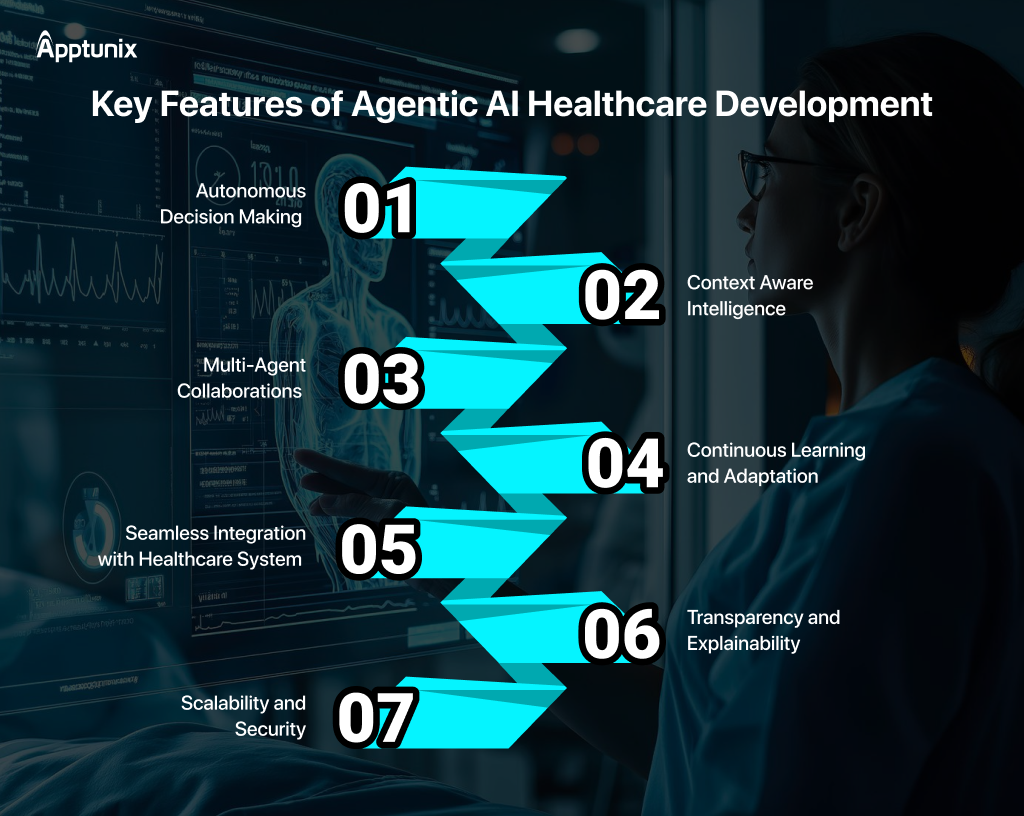
1:Autonomous Decision MakingThe best feature of an agentic AI solution is the ability to make autonomous decisions in time-sensitive situations. It can independently analyze patient data, predict risks, and recommend the best course of action without constant human input.
2:Context Aware IntelligenceAgentic AI’s content-aware intelligence feature understands patient symptoms, medical history, and clinical notes to provide deeper and relevant insights. Health professionals receive tailored recommendations rather than generic outputs, with contextual intelligence.
3:Multi-Agent CollaborationsThis feature enables multiple AI agents to collaborate on tasks such as diagnosis, monitoring, and workflow coordination. Multi-agent collaboration improves efficiency and ensures complex medical tasks are handled seamlessly.
4:Continuous Learning and AdaptationOne of the key features of agentic AI is its ability to learn and adapt. It evolves by learning from past outcomes, patient responses, and real-time data, thereby improving accuracy and reliability, making the system smarter.
5:Seamless Integration with Healthcare SystemAutonomous AI agents in healthcare can easily integrate with hospital dashboards, IoMT devices, EHRs, and lab systems. The solution ensures seamless workflows and a unified real-time view of patient health.
6:Transparency and ExplainabilityAgentic artificial intelligence for healthcare provides clear reasoning behind its suggestions, which helps healthcare professionals make the right decisions. Transparency and explainability build trust and ensure compliance with medical standards and ethical guidelines.
7:Scalability and SecurityThe system has a simple scaling process within different departments, hospitals, and even patient levels without performance concerns. It also ensures the protection of sensitive medical information through HIPAA and GDPR.
The future of medical diagnosis is shifting toward intelligent and autonomous systems. Agentic AI’s capabilities for real-time analysis, reasoning, and learning will change the way doctors diagnose diseases and provide personalized treatment.
Examine the table to understand the future of agentic AI in medical diagnosis:
AI healthcare development comes with a few challenges due to strict regulations, sensitive patient data, and the need for clinical accuracy. Here are the five agentic AI healthcare challenges with their solutions:
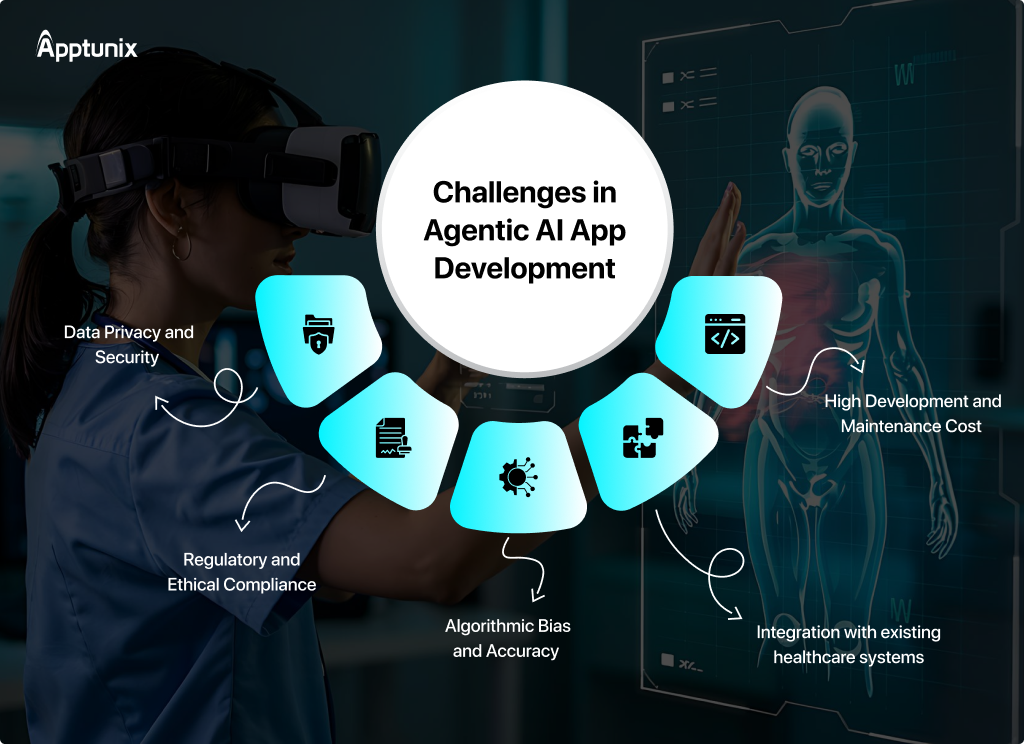
Challenge: Protecting patient data amid the risks of breaches and strict laws such as HIPAA and GDPR.
Solution: Use end-to-end encryption and role-based access controls to ensure complete data protection.
Challenge: Agentic AI healthcare apps must meet regional medical regulations, which of course, slows down the development process.
Solution: To tackle this challenge, an agentic AI healthcare development company works closely with legal experts and follows FDA, EMA, or local compliance frameworks.
Challenge: Biased or incomplete datasets used to build agentic AI for healthcare lead to incorrect diagnoses and unfair predictions.
Solution: You can overcome this challenge by training models on diverse, high-quality medical datasets and
continuously validating AI outputs.
Challenge: Numerous hospitals use outdated EHR systems that don’t easily integrate with modern AI tools.
Solution: Create secure APIs and adopt interoperability standards like HL7 and FHIR for smooth integration.
Challenge: Agentic AI in healthcare applications requires costly infrastructure, cloud systems, and continuous updates.
Solution: Mobile app developers must use scalable cloud platforms and modular AI architectures to reduce long-term development expenses.
Agentic AI healthcare development costs somewhere between $20,000 and $150,000+, depending on factors such as
Here is the table to analyze the actual cost of AI agents or solutions based on complexity. You can also see the features of each complexity app to understand the type of features your solution gets at a certain level.
You can also develop an MVP version of the agentic AI assistant to validate the AI value before scaling or investing in full-scale development. An MVP version of agentic AI can be developed for between $15,000 and $30,000. Moreover, building an AI strategy for a healthcare enterprise can also save time and cost, so don’t forget to implement that.
Also Read: Top 12+ Healthcare App Development Companies
Agentic AI in healthcare is transforming the future of hospitals, healthcare organizations, individuals, and patients. The technology is enabling smarter diagnosis, automated workflows, and personalized patient care.
From developing scalable solutions powered by multi-agent systems in healthcare AI to designing robust agentic AI architecture for healthcare, the opportunities agentic AI provides are countless.
However, building agentic AI for healthcare requires deep technical expertise, clinical understanding, and a secure agentic AI healthcare development approach. That’s where Apptunix, an AI app development company, comes into action.
At Apptunix, we specialize in agentic AI healthcare development that empowers hospitals to work faster, safer, and more efficiently. Whether you want to enhance diagnostics, optimize operations, or launch intelligent automation, our experts can turn your vision into reality.
So what are you waiting for? Invest in agentic AI and make a revolution in the healthcare industry by automating operational tasks and enhancing patient care, diagnosis, and drug discovery.
Q 1.What is agentic AI?
Agentic AI is an autonomous AI system that can plan, reason and act to complete tasks with minimum human interference. This tech is proactive and can interact with multiple tools and systems to achieve a goal like planning a trip, managing a smart home, assisting coding, automating healthcare tasks, etc.
Q 2.How is agentic AI used in healthcare?
Agentic AI healthcare use cases are:
Q 3.What are the main challenges to creating agentic AI for healthcare?
The main agentic AI healthcare challenges include:
Q 4.What is the future of agentic AI in medical diagnosis?
The technology is set to transform the healthcare industry. Agentic AI healthcare trends include:
Q 5.How much does it cost to develop an agentic AI in healthcare?
Agentic AI healthcare development costs range from $20,000 to $150,000+, depending on factors such as data complexity, AI features, integration needs, scalability, and security.
Q 6.How will Apptunix help in agentic AI healthcare development?
Apptunix builds custom, secure, and scalable agentic artificial intelligence for hospitals. We handle everything from AI architecture design to deployment, ensuring faster workflows and smarter patient care.
Get the weekly updates on the newest brand stories, business models and technology right in your inbox.
Book your free consultation with us.
Book your free consultation with us.





